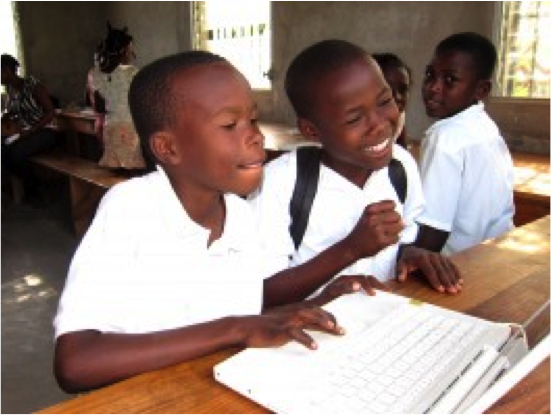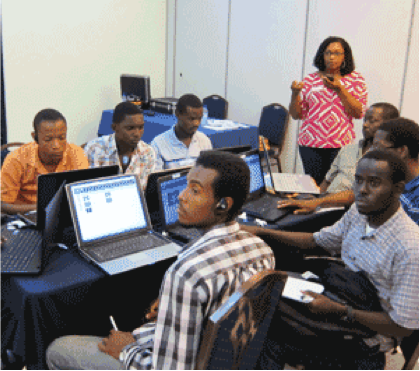Haiti is a country in transition. It promises great potential, but also faces formidable challenges related to educational quality and access.
Over the past three years and with the support of NSF, Prof. Michel DeGraff (Linguistics & Philosophy), Dr. Vijay Kumar (OEIT Director) and their team are working with MIT faculty and staff, alongside partner institutions in Haiti, on an exciting initiative that uses Open Educational Resources and educational technology to bring vibrant innovative pedagogies to STEM education in Haiti.
Stressing modalities such as active learning, hands-on exploration and student engagement, the MIT-Haiti initiative uses digital tools and pedagogies that were created at MIT and elsewhere for intensive teacher-training and curriculum-development programs in STEM areas.
Collaborating Institutions in Haiti *
This endeavor is part of a bigger vision where Prof. DeGraff is working to promote greater access to high-quality education in Haiti through technology-enabled pedagogical innovations and best learning practices. The vision also entails the removal of linguistic hurdles by elevating Haitian Creole ("Kreyòl") in regards to its use as a language of instruction. Kreyòl is spoken natively by all Haitians whereas French is inaccessible to most in Haiti. All educational technology tools and resources in the MIT-Haiti Initiative are made available to Haitian faculty and students in Kreyòl. When students learn in their mother tongue, the opportunity for deep reflection and for the elaboration of solid concepts and ideas is enhanced.[1]
A linguist and computer scientist by training, DeGraff was born and grew up in Haiti, and then received post-secondary education in the U.S. DeGraff’s research agenda has kept him strongly tied to the country of his birth. His work has focused on ‘Creoles’, languages that have long been believed to be inferior to so-called established languages. DeGraff has shown that such beliefs are unfounded: Kreyòl is linguistically rich and fully capable of expressing nuance, detail and sophisticated and complex scientific concepts. However there are gaps in specific technical vocabulary. To fill these gaps, the team of scientists and academicians involved in the MIT-Haiti initiative is creating a lexicon of scientific terms and putting Kreyòl to use in advanced scientific domains.
 At Lekòl Kominotè Matènwa (LKM) in La Gonave, Haiti, DeGraff has exposed 4th graders to interactive math tools in Kreyòl with astonishing results: eyes light up, minds are engaged, and children learn in a way that is participative, constructive, authentic and joyful.[2] DeGraff has also conducted field-based research in La Gonave showing that Haitian children who learn to read and write in Kreyòl vastly outperform children in other schools where children are taught to read and write in French.[3]
At Lekòl Kominotè Matènwa (LKM) in La Gonave, Haiti, DeGraff has exposed 4th graders to interactive math tools in Kreyòl with astonishing results: eyes light up, minds are engaged, and children learn in a way that is participative, constructive, authentic and joyful.[2] DeGraff has also conducted field-based research in La Gonave showing that Haitian children who learn to read and write in Kreyòl vastly outperform children in other schools where children are taught to read and write in French.[3]
 At high school and university levels, the MIT-Haiti Initiative is bringing Kreyòl-based and technology-enabled active learning in the classroom. Since March 2012, teams of educators, including technologists and domain experts, have travelled to Haiti to hold teacher-training and curriculum-development workshops on active learning in science and math with digital tools in Kreyòl. There have been three trips so far, with a fourth one planned for March 2014.
At high school and university levels, the MIT-Haiti Initiative is bringing Kreyòl-based and technology-enabled active learning in the classroom. Since March 2012, teams of educators, including technologists and domain experts, have travelled to Haiti to hold teacher-training and curriculum-development workshops on active learning in science and math with digital tools in Kreyòl. There have been three trips so far, with a fourth one planned for March 2014.
These workshops have included sessions on how to evaluate these innovative tools and curricula in order to measure the extent to which they increase learning gains through the combined use of Kreyòl and technology. These new materials in Haitian Kreyòl for biology, biochemistry, physics and mathematics provide opportunities for students to fully engage with the subject matter.[4]
The biology workshops have introduced StarBiochem and StarGenetics from the STAR suite (“Software Tools for Academics and Researchers”) developed at OEIT. StarBiochem is a molecular 3-D visualizer that enables the visualization and manipulation of molecular structures. The use of protein 3-D viewers has been shown to increase students’ understanding of protein structure and function, one of the core concepts for biological literacy. StarGenetics is a customizable virtual laboratory for genetics, a laboratory in which students perform crosses with model organisms. These virtual experiments improve students’ understanding of the basis of heredity.
The physics workshops have introduced the Technology-Enabled Active Learning (“TEAL”) pedagogy from the MIT Physics Department and the “Physics Education Technology” (“PhET”) tools from the University of Colorado. Through TEAL and PhET the Haitian faculty at the workshops learn how to incorporate simulation, visualization and problem-solving techniques into their traditional curricula.
In the Mathematics workshops the Haitian faculty have been provided with applets for mathematics called “Mathlets.” These tools represent abstract ideas in an accessible visual form. Many Mathlets offer images of physical systems that are modeled by the mathematical abstraction. They encourage student experimentation, and provide visual substantiation or refutation of the student’s beliefs and computations.
In effect, the MIT-Haiti Initiative is introducing in Haiti entirely new perspectives on teaching through the pedagogy of active learning and online simulations and visualizations. These pedagogical innovations are a critical part of implementing the Haitian State’s objective of improving access to higher-quality education on a national scale.
This initiative is now bringing the Haitian Ministry of Education on board with the goal of integrating Kreyòl-based and technology-enabled resources throughout the Ministry’s new high-school curricula and into their networks of public regional universities. Clearly DeGraff’s vision is building momentum and windows are opening for Haiti.
In DeGraff’s words, “The use of our native language and of technology-enabled resources for active learning gives Haitian students the necessary cognitive and academic foundations from which they can more efficiently reach higher levels of knowledge.”
-Michel DeGraff, Molly Ruggles, Vijay Kumar